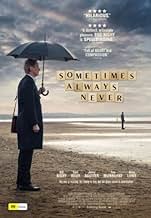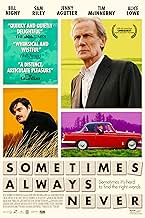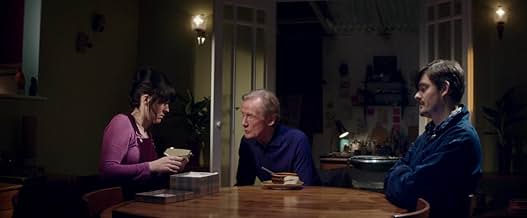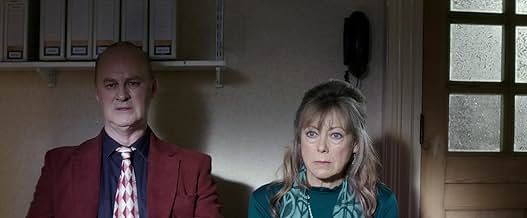IMDb रेटिंग
6.3/10
3.5 हज़ार
आपकी रेटिंग
एक जासूसी फंतासी / पारिवारिक नाटक जहां शब्दों का प्यार एक पिता को एक लापता बेटे के साथ फिर से जुड़ने में मदद करता है।एक जासूसी फंतासी / पारिवारिक नाटक जहां शब्दों का प्यार एक पिता को एक लापता बेटे के साथ फिर से जुड़ने में मदद करता है।एक जासूसी फंतासी / पारिवारिक नाटक जहां शब्दों का प्यार एक पिता को एक लापता बेटे के साथ फिर से जुड़ने में मदद करता है।
- पुरस्कार
- कुल 1 जीत
फ़ीचर्ड समीक्षाएं
I loved the movie. Bill Nighy is superb in anything he does, the rest of the cast were wonderful. It was written with humour, wittiness with a hint of sadness.
Despite the rather grim topic, the film manages not to be overly sad. In fact it is an enjoyable journey of a father who becomes obsessed with scrabble in order to cope with his loss. It is a good psychological portrayal pf grief.
If it wasn't for the presence of mobile phones and computer games you'd think that this was set in the 60's ! Bill Nighy is sparsely twinkly, just enough to make me stay in my seat for the entire film. A good cast, an intriguing storyline, almost a period piece.
I think Bill must have it in his contract for every piece he does to wear a good coat. (Apart from Dads Army).
A single delicious narrative conceit drives the delightful Sometimes. Always. Never. (2018). It takes its own sweet time getting there, but when it does, it hits home: you can be an expert in words and their rules but be incapable of meaningful expression. Add a Scrabble obsession, mix it with deep grief and guilt, and you have a portrait of a family desperately unable to communicate with each other.
The simplicity of the plotline stands in stark contrast to the complexity of its themes. Dapper rule-bound tailor Alan (Bill Nighy) is told that the body of his long-missing son Michael may have been found. He takes his younger estranged son Peter (Sam Riley) with him to identify the body, and at the morgue they meet other parents who are there for the same reason. It's a diversion that does little to advance the narrative, but it does provide comic respite from the pain of loss. Both relieved and disappointed with the outcome, Alan invites himself to stay with Peter and his family in the hope of reconciliation.
With a threadbare plot, the power of this film comes from its theatrical settings, intelligent banter, and Nighy's trademark whimsical mannerisms and stylised performance. The label 'fantasy drama' has been applied to this film but is mis-leading and manifestly inadequate. If there is an element of fantasy, it derives from the way many scenes are played out against backgrounds that are have a surreal, even an absurdist two-dimensional feel that resembles a theatre set. Like all absurdism, there is an artful space between the underlying emotional intensity and the futility of ever trying to understand it. The gravelly Nighy is a master of under-statement, with a unique talent for giving shallow dialogue depth and humour. It's all about contrasts: Alan's obsession with a missing son and neglect of the son he still has; his fastidious Dymo labelling of everything as a substitute for control in his world; and his ability to make light of the heaviest emotions.
If you are not a Nighy fan or prefer action-based stories, you may find little to appreciate in this film. In place of a forward-moving narrative it offers a portrait of a dysfunctional family torn apart over guilt and the inability to emotionally connect. The film's title is itself a parody of form over function, referring to the tailor's rule for how jacket buttons should be fastened: the top always, the middle sometimes, the bottom never. With no substantive relationship to the film's content, it's a rule as good as any on how to live one's life.
The simplicity of the plotline stands in stark contrast to the complexity of its themes. Dapper rule-bound tailor Alan (Bill Nighy) is told that the body of his long-missing son Michael may have been found. He takes his younger estranged son Peter (Sam Riley) with him to identify the body, and at the morgue they meet other parents who are there for the same reason. It's a diversion that does little to advance the narrative, but it does provide comic respite from the pain of loss. Both relieved and disappointed with the outcome, Alan invites himself to stay with Peter and his family in the hope of reconciliation.
With a threadbare plot, the power of this film comes from its theatrical settings, intelligent banter, and Nighy's trademark whimsical mannerisms and stylised performance. The label 'fantasy drama' has been applied to this film but is mis-leading and manifestly inadequate. If there is an element of fantasy, it derives from the way many scenes are played out against backgrounds that are have a surreal, even an absurdist two-dimensional feel that resembles a theatre set. Like all absurdism, there is an artful space between the underlying emotional intensity and the futility of ever trying to understand it. The gravelly Nighy is a master of under-statement, with a unique talent for giving shallow dialogue depth and humour. It's all about contrasts: Alan's obsession with a missing son and neglect of the son he still has; his fastidious Dymo labelling of everything as a substitute for control in his world; and his ability to make light of the heaviest emotions.
If you are not a Nighy fan or prefer action-based stories, you may find little to appreciate in this film. In place of a forward-moving narrative it offers a portrait of a dysfunctional family torn apart over guilt and the inability to emotionally connect. The film's title is itself a parody of form over function, referring to the tailor's rule for how jacket buttons should be fastened: the top always, the middle sometimes, the bottom never. With no substantive relationship to the film's content, it's a rule as good as any on how to live one's life.
A very surreal looking film. Interesting colours and tones and deliberate filming car scenes over a filmed background.
In essence it is about relationships and long-term grief ... and scrabble.
It is worth a watch.
In essence it is about relationships and long-term grief ... and scrabble.
It is worth a watch.
क्या आपको पता है
- ट्रिवियाThe film is based on a short story called Triple Word Score, written by the script writer Frank Cottrrel Boyce.
- गूफ़When Alan claims that "jazz" is a high-scoring word in Scrabble, a character corrects him by stating it's impossible to play since there's only one Z tile in the set. In reality, this word is indeed playable using "wild card" tiles. If using J, A, and Z tiles and a wild card tile in place of the other Z, the word would be a high-scoring word worth a minimum of 19 points.
- कनेक्शनFeatured in Projector: Sometimes Always Never (2019)
- साउंडट्रैकSometimes Always Never
Written by Edwyn Collins and Sean Read
Performed by Edwyn Collins, Sean Read and Chay Heney
टॉप पसंद
रेटिंग देने के लिए साइन-इन करें और वैयक्तिकृत सुझावों के लिए वॉचलिस्ट करें
- How long is Sometimes Always Never?Alexa द्वारा संचालित
विवरण
- रिलीज़ की तारीख़
- कंट्री ऑफ़ ओरिजिन
- आधिकारिक साइट
- भाषा
- इस रूप में भी जाना जाता है
- Triple Word Score
- फ़िल्माने की जगहें
- उत्पादन कंपनियां
- IMDbPro पर और कंपनी क्रेडिट देखें
बॉक्स ऑफ़िस
- US और कनाडा में सकल
- $39,191
- US और कनाडा में पहले सप्ताह में कुल कमाई
- $2,599
- 14 जून 2020
- दुनिया भर में सकल
- $14,17,047
- चलने की अवधि1 घंटा 31 मिनट
- रंग
- पक्ष अनुपात
- 2.35 : 1
इस पेज में योगदान दें
किसी बदलाव का सुझाव दें या अनुपलब्ध कॉन्टेंट जोड़ें































